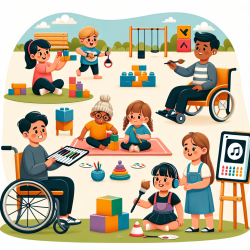In the dynamic field of speech-language pathology, the quest for effective clinical supervision models is ongoing. Traditional one-on-one supervision, while beneficial, has its limitations, including fostering a dependency of clinicians on their supervisors. An intriguing alternative is the group supervision model, particularly the Teaching Clinic model, which has shown promise in fostering clinical growth, independence, and self-supervision among speech-language pathology students.
The Teaching Clinic model is a peer-group form of supervision designed to enhance supervisor-clinician interaction during clinical practicum. It aims to foster clinical growth and independence through self-supervision, leveraging peer and group feedback. This model requires clinicians to bring a videotape of their therapy session to the conference, where it is observed and discussed by peers, facilitating a rich exchange of strategies, alternative approaches, and constructive criticism.
A study conducted by Sleight, Power Cluver, and Calloway explored student reactions to group supervision based on the Teaching Clinic model. The study involved thirty undergraduate and graduate students participating in group supervision during their clinical practicum. Student responses were overwhelmingly positive, highlighting the effectiveness of group supervision in improving self-analysis skills and fostering a supportive learning environment.
Key Findings from the Study
- Students preferred the Teaching Clinic model over traditional one-on-one supervision, citing it as an effective form of supervision.
- Group supervision fostered an atmosphere of trust and cohesiveness, encouraging open and constructive feedback.
- The model was effective in improving clinical skills, as students felt that the analysis of their therapy was directed at them as professionals, not as persons.
- Group supervision facilitated additional discussion outside the meetings, enriching the learning experience.
- Students did not feel threatened when their videotapes were shown to peers, indicating a non-threatening, professional environment.
Implementing Group Supervision in Clinical Training
To harness the benefits of group supervision in speech-language pathology clinical training, several strategies can be adopted:
- Encourage Peer Feedback: Foster an environment where students feel comfortable providing and receiving constructive feedback. This promotes clinical growth and learning from peers' strengths and weaknesses.
- Utilize Video Analysis: Incorporate video analysis of therapy sessions into group supervision. This allows for detailed discussion of clinical techniques and strategies, enhancing learning outcomes.
- Promote Self-Supervision: Encourage students to engage in self-analysis and reflection on their clinical practice. This fosters independence and the development of critical self-evaluation skills.
- Facilitate Additional Discussion: Encourage discussions beyond the group supervision meetings. This can include online forums or small group discussions to further enrich the learning experience.
- Ensure a Supportive Environment: Create a supportive and non-threatening environment where students can openly share their experiences and challenges. This fosters a sense of community and mutual support among students.
Challenges and Considerations
While the benefits of group supervision are clear, implementing this model comes with its challenges. It requires careful planning to ensure that each session is productive and that all students have the opportunity to participate and receive feedback. Additionally, maintaining a supportive and non-threatening environment is crucial for the success of group supervision. Supervisors must be skilled in facilitating discussions and managing group dynamics to ensure a positive and constructive learning experience for all participants.
Conclusion
The Teaching Clinic model of group supervision offers a promising alternative to traditional one-on-one supervision in speech-language pathology clinical training. It fosters an environment of peer learning, self-supervision, and professional growth. By implementing the strategies outlined above, clinical supervisors can enhance the effectiveness of their supervision and contribute to the development of competent and independent speech-language pathologists.
For practitioners interested in exploring this model further or seeking to improve their supervisory skills, delving into the research on group supervision can provide valuable insights and guidance. Embracing innovative supervision models like the Teaching Clinic can significantly impact the quality of clinical training and ultimately, the quality of care provided to clients.
To read the original research paper, please follow this link: Student Reactions to Group Supervision.










